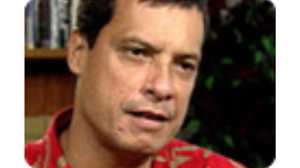Hawaiians Remember: Haunani-Kay Trask

Haunani-Kay Trask is a historian, human rights advocate, and professor at the University of Hawaii's Center for Hawaiian Studies. She is the author of From a Native Daughter: Colonialism and Sovereignty in Hawai'i.
Grieving for Joe Kahahawai
At funerals, especially in that time, Hawaiians would wail — which is a traditional grief chant, really. And not only do they do that at the funeral, but they do it if there's any kind of group that goes up to the graveyard, then they do it as they go. And, Hawaiians can also chant at the gravesite. So, all of that is a kind of wailing of sorrow. And Kahakawai's funeral had that.
And, also I think the idea that the injustice was so recent to the overthrow, yet another blow to Hawaiian people, another assault on us. And that they were going to get away with it. The assumption always is when we're injured, the people who injure us are going to get away with it. And that's the legacy of the overthrow. That's part of our bad feeling that — and in fact, I've heard my own people say — "oh, there's no point in saying anything because it's not going to work." And I'm certain that's what people thought about the death of Kahahawai, that nothing was going to come of it. They were not going to be punished, the murderers. They were not going to be brought to justice. And the worst part of all is, one more Hawaiian man is dead.
Stories About the Massie Case
We lived for a while in my grandfather's house here in Kaneohe. He was a territorial senator for, I think, two and a half decades. And they talked about it, my parents and all of their friends that would come to the house when there was some victory, for example, political victory. Then we'd have big luaus at our house. And I was about maybe five or six and I would hear what they had to say, and what they always said was that this man, Kahahawai, was murdered by haoles and they got away with it. And that's what I took until I was in high school and then began to learn more about the circumstances. But we grew up hearing about how the military, which the Fortescue and Massie people were, and they were here by the thousands on Oahu and they could go anywhere and do anything they wanted. So it was there in the very farthest back of my memory.
Fear of the Military
When I was a senior, there were things in high school called military balls, which shows you the connection between high school education and the military. And we went to a military ball at one of the military restaurants or clubhouses. And my mother didn't want me to go. She didn't want me to go there even though it was opened for us, for the Kamehameha Schools to go and have our little -- because all the boys were R.O.T.C., four years, and we were what were called sponsors -- it was acting like you were a grown up. And she was afraid. She didn't want me to go because she said, once you get on the military base, they control everything. They can stop you. They can detain you. So we grew up being afraid of the military.







